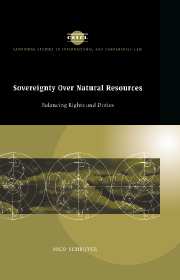Book contents
- Frontmatter
- Contents
- List of boxes, figures and tables
- Preface
- Acknowledgments
- List of abbreviations
- List of main symbols used in UN documents
- Glossary
- Table of cases
- 1 Introduction
- PART I The birth and development of the principle: the UN General Assembly as midwife
- PART II Natural-resource law in practice: from creeping national jurisdiction towards international co-operation
- PART III Balancing rights and duties in an increasingly interdependent world
- Appendices
- Bibliography
- Index
- Books in the series
Preface
Published online by Cambridge University Press: 23 October 2009
- Frontmatter
- Contents
- List of boxes, figures and tables
- Preface
- Acknowledgments
- List of abbreviations
- List of main symbols used in UN documents
- Glossary
- Table of cases
- 1 Introduction
- PART I The birth and development of the principle: the UN General Assembly as midwife
- PART II Natural-resource law in practice: from creeping national jurisdiction towards international co-operation
- PART III Balancing rights and duties in an increasingly interdependent world
- Appendices
- Bibliography
- Index
- Books in the series
Summary
My interest in natural-resource management has deep roots. Born into a farming family in a small village in West Friesland, in the north of the Netherlands, I have always cherished the products of nature, initially because of the economic value they represent. We lived in a coastal region at sea level, safely protected by three dikes which have served as lines of defence against flooding since the late fifteenth century. They were called De Waker (‘The Watchman’), De Dromer (‘The Dreamer’, to be awakened whenever the water would reach its foot) and De Slaper (‘The Sleeper’). Only later was I to become aware of the beauty of these dikes and the surrounding landscape and of the vulnerability of the natural environment.
My academic interest in the topic of this book first crystallized when I took courses in international law, the sociology of international relations, peace research and the economics of development at the University of Groningen. I thus became acquainted with Third World efforts to establish a New International Economic Order. These efforts included claims to full permanent sovereignty over natural resources and demands for more equitable commodity prices. The political organs of the United Nations served as the forum of debate as well as a vehicle for letting off political steam.
- Type
- Chapter
- Information
- Sovereignty over Natural ResourcesBalancing Rights and Duties, pp. xvi - xviiPublisher: Cambridge University PressPrint publication year: 1997
- 2
- Cited by

